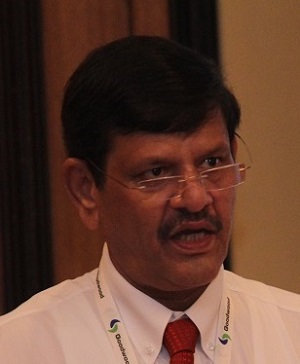Singapore: Outlook for 2016
Offshore vessel operators in Singapore are basically in survival mode, but their troubles are not universally reflected across the region’s shipping industry. MarEx spoke to some key players to get their views on the year just past and the year to come.
%20photo.jpg) Rutger Bierman, Managing Director of London Offshore Consultants (Singapore) says offshore operators are trying to keep their tonnage operating, much of which is laid-up as regional projects are thin on the ground. “Many are operating simply at or even below cost, he says. “A good many Asian operators are moving their vessels to other areas where there is more available work, for example the Middle East and West Africa.”
Rutger Bierman, Managing Director of London Offshore Consultants (Singapore) says offshore operators are trying to keep their tonnage operating, much of which is laid-up as regional projects are thin on the ground. “Many are operating simply at or even below cost, he says. “A good many Asian operators are moving their vessels to other areas where there is more available work, for example the Middle East and West Africa.”
The reduced price of oil is the key driver of the downturn as is the current oversupply of vessels. “It is expected that an increase of around 15 percent in PSVs coming on to the market in 2016 could result in companies shedding their older tonnage. With the proliferation of speculative building, this will result in the day rates for charters coming down even further,” says Bierman.
“In 2016 we believe operators will keep making efficiencies of cost, and this includes cost savings on service provision to vessels. Everyone has a different opinion, of course, and all are valid, by and large, because this is speculation and nobody has a crystal ball to see the future, even the fairly short-term future,” says Bierman. “However, our view is that we expect the depressed mood will continue for most of the year. We are preparing our own work and consultancy services so we ensure that we emerge stronger when the downturn becomes an upturn, as it inevitably will – it is just a question of when, not if.”
A Bright Spot for LNG
Bierman sees LNG as a relatively bright light in an otherwise darkened global maritime market – “although frankly less so in Asia as many projects are delayed or suspended while the downturn is upon us.” LOC is currently doing work on a number of floating storage facilities and terminals.
“In Australia, although the mood is also sober to say the least, some of the giant terminals, or giga-projects, are due to come online, such as Gorgon. These will likely elevate Australia to become one of the world’s leading LNG exporters. Obviously, this has very positive implications for the Asia and Australasia area at large, although it will also result in potential oversupply and therefore lower gas prices.”
Overall, says Bierman, Singapore is remaining strong and competitive in many areas, largely due to the high quality of work provided by the shipyards and also to the commitment and attention of the authorities in the terms of their robust and effective corporate governance.
Supply Side
 According to Gene Lee, Business Manager, Shipping Services, GAC Singapore, 2015 has been a challenging year for everyone involved in the Singapore shipping market, including those working in the ship services market. “It is also noticeable that different shipping sectors have been affected in varying degrees by the tough market conditions. The offshore market has been worst hit, with a number of very cost-conscious offshore operators downsizing their operations and in some cases, relocating from Singapore to Malaysia.
According to Gene Lee, Business Manager, Shipping Services, GAC Singapore, 2015 has been a challenging year for everyone involved in the Singapore shipping market, including those working in the ship services market. “It is also noticeable that different shipping sectors have been affected in varying degrees by the tough market conditions. The offshore market has been worst hit, with a number of very cost-conscious offshore operators downsizing their operations and in some cases, relocating from Singapore to Malaysia.
“On the other hand, we are still seeing a decent level of activity in the bulk market, despite the challenges facing that sector. The tanker market has also improved during 2015, as a result of the increased trading opportunities for tanker owners and operators due to oil price volatility. Of course, Singapore continues to see a lot of bunkering activity, as would be expected for one of the world’s biggest bunkering hubs.”
Lee anticipates 2016 will be a steady year, although it would be too optimistic to expect any significant recovery across all sectors. “There is no light at the end of the tunnel for the offshore sector at present, and the dry bulk and container sectors will remain challenging, but we expect the recent upturn in tanker activity to be sustained into next year.
“There are still decent opportunities for ship agents who have an important role to play in supporting their customers during these tough times. Many ship owners and operators rely on us to help them find the cost savings and efficiency gains that they need to survive in a difficult market. In some cases, shipping companies are outsourcing their operations to agents as the most cost-effective way to reduce their overheads and drive up productivity.”
Tanker Management
 Captain Ashok Sabnis, managing director of Goodwood Ship Management is expecting to increase the company’s managed fleet in 2016. “We are currently managing 34 vessels, with induction of another six VLCCs and other projects in hand. By the end of 2016, we are expecting to manage about 45 vessels. At the current stage, we are beyond critical mass to sustain our operations. We are focusing on delivering economies of scale and a personalized service to our valued customers.”
Captain Ashok Sabnis, managing director of Goodwood Ship Management is expecting to increase the company’s managed fleet in 2016. “We are currently managing 34 vessels, with induction of another six VLCCs and other projects in hand. By the end of 2016, we are expecting to manage about 45 vessels. At the current stage, we are beyond critical mass to sustain our operations. We are focusing on delivering economies of scale and a personalized service to our valued customers.”
Singapore is a vibrant ship management center, says Sabnis. “We would not choose to be anywhere else as it is perhaps the most important center for tanker managers which we focus on. The business and government partnership in the shipping industry in Singapore means it is an ideal place for us. Rising cost is an issue but the strengthening U.S. dollar (against the Singapore dollar) in 2015 means that the cost issue has eased a little. Singapore is one of the world’s leading international maritime centers with a great maritime infrastructure including banks, law firms, surveyors, insurance companies. So this will remain our home for the foreseeable future.”
2015 has been one of improvement for the tanker sector which is in contrast to the rest of the shipping industry. “We believe the demand-supply equation in shipping is still a concern, and there is probably too many tankers being ordered. But as now the tanker sector is positive, freight rates are strong and tanker operators are having reasonably good times. This is all good for tanker managers.”
2016 will be a year of caution, says Sabnis. “Although the low oil price does not directly have an impact on the tanker management sector, a falling oil price could have negative knock on effect in our markets and in the world economy in general. As a manager we shall continue to grow with prudence and caution.”
Sabnis says the government is very supportive. “It really has great sympathy and understanding with the shipping industry, and I believe that will continue over the long term because the government here understands the maritime sector’s health is vital to the overall health of the Singapore economy”
The opinions expressed herein are the author's and not necessarily those of The Maritime Executive.
